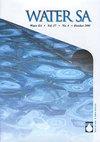Assessing the benefits of real-time control to enhance rainwater harvesting at a building in Cape Town, South Africa
IF 1.2
4区 环境科学与生态学
Q4 WATER RESOURCES
引用次数: 0
Abstract
In the period 2015–2017, the City of Cape Town, South Africa, faced the possibility of taps running dry due to a prolonged drought. To mitigate the impacts of water scarcity, many households installed rainwater tanks to harvest water to use for non-potable purposes such as toilet flushing and washing. The installation of the rainwater tanks was mainly arbitrary, in response to perceived impact of water scarcity rather than a systematic needs assessment. This study was thus undertaken to determine the available opportunity to optimise the use of these rainwater tanks using real-time control (RTC) techniques. Many studies have demonstrated the potential of rainwater harvesting (RWH) systems to supplement potable water supply and minimize stormwater flows to downstream drainage networks. RTC technology can be used to enhance the performance of RWH systems in achieving these two objectives, by receiving a rainfall forecast and initiating pre-storm release in real time. In this study, RTC was applied on the RWH system at the New Engineering Building, University of Cape Town (UCT) to enhance water supply and increase rainwater retention period. The performance with RTC was compared with the conventional management of the RWH system. It was determined that RWH with RTC technology was generally superior in simultaneously achieving water supply and rainwater retention benefits compared to the conventional management approach. RTC provides an active operation which optimizes the performance of the system across varying conditions but requires an assiduous management process designed to meet set objectives. It was concluded that the active release mechanism employing RTC exhibited great potential; the system opens up the possibility of delivering a more robust and reliable system due to its ability to provide failure detection and centralised control. The system can readily be adapted to variation of local climatic conditions in the short and long term.在南非开普敦的一座建筑中,评估实时控制提高雨水收集的效益
在2015-2017年期间,由于长期干旱,南非开普敦市面临着水龙头干涸的可能性。为了减轻缺水的影响,许多家庭安装了雨水罐,收集非饮用用途的水,如冲厕所和洗涤。雨水罐的安装主要是随意的,是为了应对水资源短缺的影响,而不是系统的需求评估。因此,进行这项研究是为了确定利用实时控制(RTC)技术优化使用这些雨水罐的现有机会。许多研究已经证明了雨水收集(RWH)系统在补充饮用水供应和减少雨水流向下游排水网络方面的潜力。RTC技术可用于提高RWH系统的性能,通过接收降雨预报和实时启动风暴前释放来实现这两个目标。在本研究中,RTC应用于开普敦大学(UCT)新工程大楼的RWH系统,以提高供水和增加雨水潴留期。将RTC与RWH系统的常规管理进行了性能比较。研究确定,与传统管理方法相比,采用RTC技术的RWH在同时实现供水和雨水保留效益方面普遍优于传统管理方法。RTC提供了一种主动操作,在不同的条件下优化系统的性能,但需要一个精心设计的管理过程来满足设定的目标。结果表明,利用RTC的主动释放机制具有很大的潜力;由于能够提供故障检测和集中控制,该系统开辟了提供更强大、更可靠的系统的可能性。该系统可以很容易地适应当地短期和长期气候条件的变化。
本文章由计算机程序翻译,如有差异,请以英文原文为准。
求助全文
约1分钟内获得全文
求助全文
来源期刊

Water SA
环境科学-水资源
CiteScore
2.80
自引率
6.70%
发文量
46
审稿时长
18-36 weeks
期刊介绍:
WaterSA publishes refereed, original work in all branches of water science, technology and engineering. This includes water resources development; the hydrological cycle; surface hydrology; geohydrology and hydrometeorology; limnology; salinisation; treatment and management of municipal and industrial water and wastewater; treatment and disposal of sewage sludge; environmental pollution control; water quality and treatment; aquaculture in terms of its impact on the water resource; agricultural water science; etc.
Water SA is the WRC’s accredited scientific journal which contains original research articles and review articles on all aspects of water science, technology, engineering and policy. Water SA has been in publication since 1975 and includes articles from both local and international authors. The journal is issued quarterly (4 editions per year).
 求助内容:
求助内容: 应助结果提醒方式:
应助结果提醒方式:


